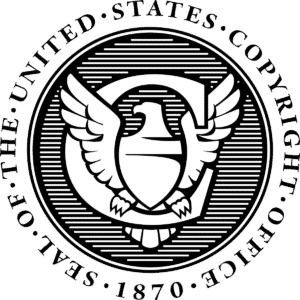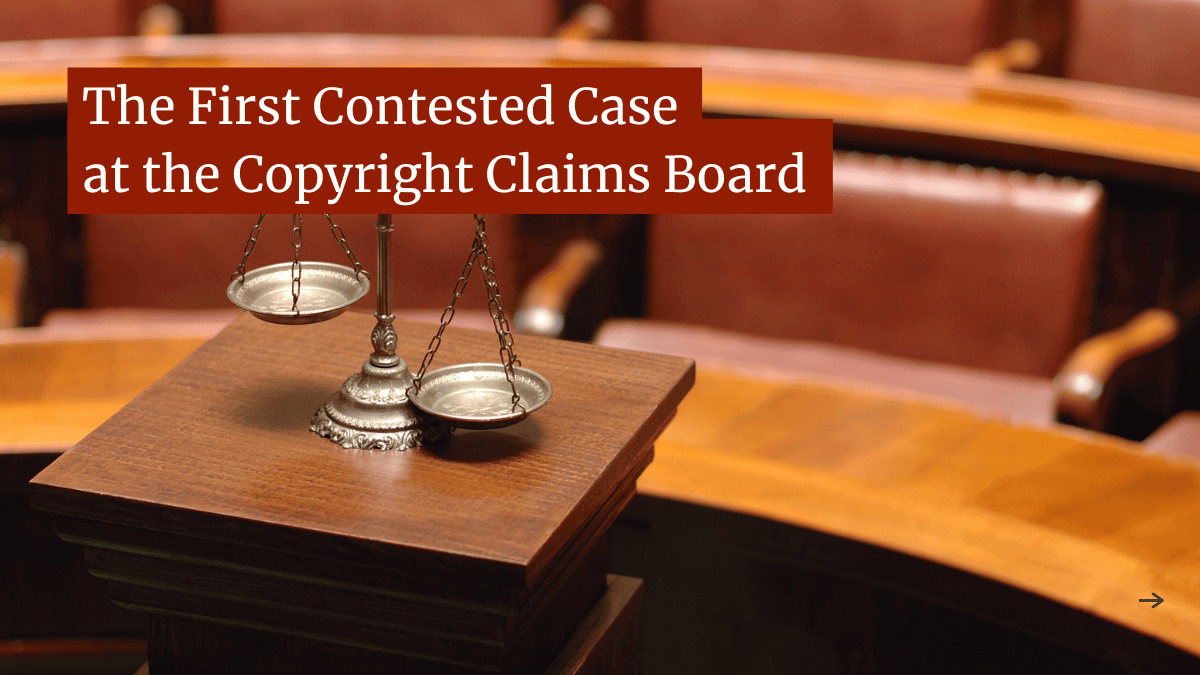The First Contested Case at the Copyright Claims Board

The Copyright Claims Board (CCB) launched in June 2022. The goal of the board was to create something akin to a copyright small claims court and make litigating copyright cases cheaper, easier and faster, both by capping damages and reducing the need for lawyers.
Since then, well over 300 cases have been filed with the CCB. However, as of today, the CCB has not ruled on a single case. This is for two reasons.
First, the time frame of these cases are such that none have played out fully. Second is that many of the cases are being dismissed, either due to incomplete complaints or failure to serve respondents.
That said, at least four cases are being contested right now, meaning that the respondent has opted in to the proceeding and has filed a response in the case.
However, it’s the first that is both the most unusual and the most interesting. As such, it’s worth taking a minute to understand the case and how it could chart a path for the CCB in the months and years to come.
Oppenheimer v. Prutton – 22-CCB-0045
The case found its way to the CCB through an unusual path. The case was originally filed in February 2021 in the Northern District of California as a traditional copyright case.
However, both parties agreed to move the case to the CCB and the court granted them a stay to do so in April 2022, over two months before the CCB opened its doors. The plaintiff in the case, David Oppenheimer, then filed the claim with the CCB in July 2022, using his original complaint for the claim.
Because of how the case landed before the CCB, it was able to skip several steps most cases have to go through. There was no evaluation of the original claim, no need to provide service, and no concern about a party opting out. As such, the case largely moved straight to the “active phase” with a scheduling order being published in October 2022.
The facts of the case are fairly basic. Oppenheimer is a photographer and accuses Douglas Prutton of using one of his images on a website for his law practice. Oppenheimer claims to have learned about the infringement using an image tracking service and that he initially tried to negotiate with Prutton , butbut that they were unable to reach a deal.
As such, Oppenheimer filed the original lawsuit alleging copyright infringement in the use of the photograph and violations of the Digital Millennium Copyright Act (DMCA) for the removal of copyright management information. The DMCA claim was dropped in the filing with the CCB.
Prutton, for his part, admits that the image was used on his site. He claims that his daughter built the website for him and a statement from her says that she found the image without any watermarks, making the DMCA claim invalid.
He goes on to claim that Oppenheimer negotiated in bad faith, demanding $30,000 for the use of the image and rejecting an offer of $500. Furthermore, he claims that Oppenheimer is a “copyright troll” who has filed some 176 cases in federal court and has earned the vast majority of his income from litigation settlements.
As such, he is asserting a fair use defense, claiming that Oppenheimer is operating with unclean hands and that, if Oppenheimer is awarded statutory damages, they should be the minimum. Oppenheimer disputes those claims in his response to Prutton’s response.
Why This Case is Important
This case is important both for the reasons it is common and the reasons it is unusual.
As we discussed in August of last year, photographers and visual artists make up the lion’s share of CCB cases. They’ve long been frustrated with the lack of recourse, and it’s clear many were eager to try this new path.
In that regard, this case is extremely similar to a large number of other cases filed with the CCB. An artist, dealing with infringement of their work on the Web, has filed a case hoping for some relief.
However, its unusual arrival before the CCB makes the case stand out. Where most artists file directly with the CCB, this case started out in federal court and has ended up here following an agreement by both parties (before the CCB even opened).
To that end, this may be an example of the CCB doing exactly what it was meant to do: Providing an alternative to the federal court system.
In his reply, Prutton said, “I am not a copyright lawyer, but I cannot imagine how there could be a smaller case,” and he’s likely right. While it’s a frustratingly common type of infringement that’s alleged, no one case justifies the headaches and expense of the federal court system.
As such, this will be a case to watch. Depending on the outcome and how satisfied both parties are with it, we could see a lot more federal cases be diverted to the CCB.
Three Other “Contested” Cases
In addition to the above case, at least three other CCB cases have seen replies from the respondent, here is a quick rundown of those three cases:
- DM Records, Inc. v. Ravesta, LLC – 22-CCB-0009: This is a case dealing with alleged unauthorized musical sampling as part of a DJ set. In this case, DM Records accuses Ravesta of sampling the song Techno Bass (Eurobass Mix). Ravesta has responded saying they removed the song from their DJ sets but that they did not earn any revenue from the song and claim the case is over some friends falling out.
- Totin v. Brighton Management Group – 22-CCB-0075: Allegations are that the company, Brighton Management, unlawfully used photos that Brian Totin took of a rental property on various websites. Totin says the images were licensed solely to a realtor that formerly represented the owners. The respondents acknowledge the use of the photos, but say they were unaware that it was an infringement and the value of the photos is closer to $500, not the $30,000 in damages sought by Totin
- Flores v. Mitrakos – 22-CCB-0035: The case deals with an alleged false DMCA takedown of an app from the Google Play Store. According to the claimant, the app was removed despite it being partially under their copyright and having permission for the content that was used. The respondent, however, has declined to contest claims and has already agreed not to file any further DMCA notices. Both parties have filed a request for dismissal, though the CCB has not granted it yet.
All in all, these are three very different cases that highlight the wide variety of cases before the CCB. Though photographer cases are the most common, that is a plurality and not an outright majority.
Bottom Line
Though it’s taken nearly 8 months, we finally have reached a point where at least some of the CCB cases are being contested. This will give us the chance to understand how the CCB will work in these cases, the types of rulings they will hand down.
In the end, what I find most interesting about the contested cases is that they all seem to acknowledge some degree of infringement likely took place. The issue, instead, centers more around the damages that should be awarded.
That, in turn, may be one of the best areas for the CCB to work in. Cases where there are limited facts or legal issues in dispute, but there are significant questions about how much is fair to award.
To that end, it could be a powerful tool for resolving these disputes, which, previously, didn’t have a tool between arbitration and a regular lawsuit.
After all, the CCB is trying to find its place in the copyright landscape the same as the people filing with it are trying to find theirs.
With that in mind, this could be a powerful indicator of the future direction of the CCB.
Want to Reuse or Republish this Content?
If you want to feature this article in your site, classroom or elsewhere, just let us know! We usually grant permission within 24 hours.
